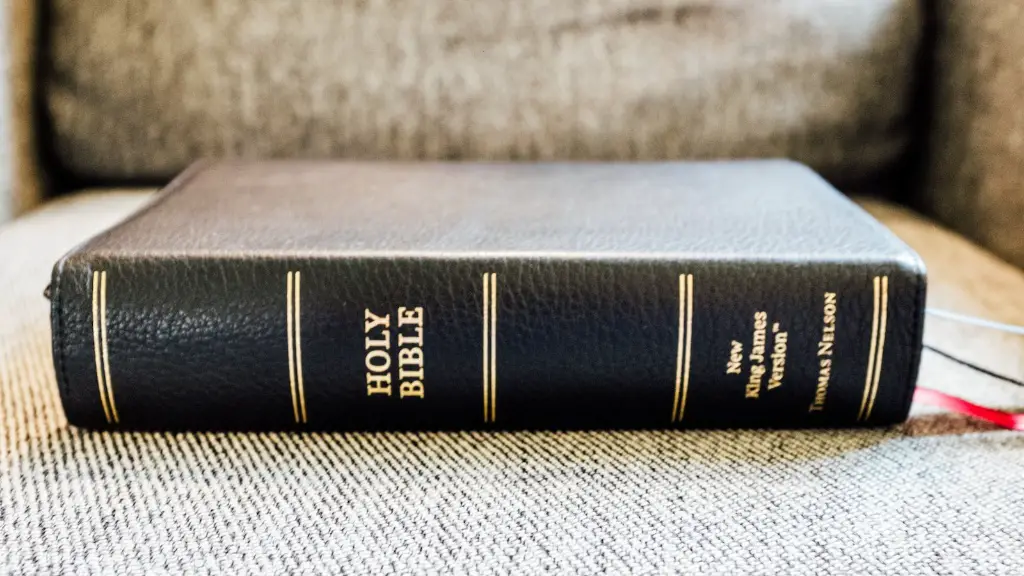Did Any Women Write The Bible?
The Bible, one of the most widely-read books in the world, has long been a source of inspiration and knowledge to its readers. But who wrote it? Furthermore, did any women write The Bible?
To answer this question, it’s important to consider what we know about biblical authorship. As it turns out, the Bible itself provides very little information about its authors. Even so, there are some clues that point to the possibility of female authorship.
For instance, some biblical text actually seems to be directly attributed to women. Take, for example, the book of Ruth, which is credited to its protagonist, Ruth, a Moabite woman. Similarly, Proverbs 31:10-31 is officially credited to an anonymous “wise woman.”
Moreover, some experts argue that the fact that certain Old Testament books feature female protagonists and lack male protagonists suggest that a female author was likely behind them. Take, for example, the book of Esther, which only features male villains and no male hero.
Then, there is the commonly-accepted hypothesis that certain books, such as the book of Proverbs, were initially a compilation of wise sayings by different authors. Since some of these sayings refer to “wise women” and “the mother of a virtuous woman,” some experts believe that at least one of these authors was a woman.
Finally, there is evidence, albeit scant, that suggests some female scribes were present in ancient times. Thus, it is not inconceivable that a female scribe could have contributed to the composition of some parts of the Bible.
Women as Prophetesses in The Bible
The Bible features numerous examples of female prophets, such as Huldah, the prophetess mentioned in 2 Kings 22:14. What’s more, the book of Judges records the stories of Deborah and her role as a prophetess, judge and “mother in Israel.”
In the New Testament, Mary, the mother of Jesus, is also identified as a prophetess when she participates in the temple service in Luke 2:36. Meanwhile, many women are also referred to or shown as prophetesses in the Acts of the Apostles.
Though there is no evidence to suggest that these characters wrote the Bible, their status as prophetesses does go some way towards demonstrating that women could be seen as figures of authority in biblical times.
Female Characters in The Bible
The Bible also features many examples of female characters whose roles go beyond those of prophetesses. In Genesis 16:7-15, Hagar is described as a “wild ass of a woman” who was sent away by Abraham and then rescued by God. In particular, her story is a study in strength and resilience in the face of oppressive circumstances.
Moreover, Esther, a young Jewish woman, is famously credited with saving her people from a genocidal plot, as recorded in the book of Esther. Her bravery and willingness to save her beloved people exemplifies hope, honour and faith. Similarly, female characters like Ruth and Sarah are well-known for their courage in the face of great adversity.
What’s more, the stories of these characters show that they were capable of exerting a great deal of influence. For instance, Abigail is often credited with stopping a civil war inIsraelby persuading her husband, David, not to fight.
Women in Positions of Authority in The Bible
While the Bible does not record any explicit examples of women in positions of religious authority, there are numerous examples of female characters exerting authority in other areas. Take, for example, Miriam, Moses’ sister, who is credited with leading Israel in the exodus fromEgypt. Similarly, there are several examples of female judges in the book of Judges, such as Jael and Deborah.
In the New Testament, two women are explicitly mentioned as holding positions of authority: Mary Magdalene, who is credited with being the first witness to the resurrection of Jesus, and Junia, a female apostle mentioned in Romans 16:7. Furthermore, according to tradition, Mary of Bethany was seen by many early church fathers as a role model of a woman skilled in both teaching and prophecy.
From these examples, it appears that women in biblical times did wield a considerable degree of influence and authority, although this authority was not explicitly sanctioned by the religious texts of the time.
Female Scholars in Ancient Times
How does this evidence point to female authorship of the Bible? Well, it suggests that women could have had access to more literate pursuits, such as writing and scribing, in ancient times.
What’s more, there is evidence that, at least in certain times and places, female scholars were not unheard of. Archaeological remains uncovered in ancient Israel, for example, include papyrus fragments written by female scholars. Moreover, the earliest known Biblical manuscripts, written in the fourth century CE, were all penned by female scribes.
This evidence, though slim, could suggest that women were involved in writing down and editing the Bible in some form, at least at some point in its history.
Impact of Women in The Bible
Though the authorship of the Bible is still shrouded in mystery, the evidence presented above paints a picture of women as influential characters, in ways that are both subtle and profound.
From prophets and judges to brave daughters of Israel, the Bible features a wide range of female characters with impressive levels of courage and fortitude. What’s more, these characters seem to have been held in high esteem by their male counterparts, suggesting that women in ancient Israel could enjoy an enhanced status.
Finally, though there is no conclusive evidence to suggest that any woman wrote The Bible, the scant evidence that does exist does suggest that women in ancient times could have been involved in its composition.
The Influence of Women Today
Thus, while it may not be possible to definitively answer the question of whether any woman wrote The Bible, what we do know suggests that women were at least part of the process of creating it.
As such, the influence of women in history should not be understated. Women in antiquity were able to gain a certain degree of influence, no matter how limited, and thus leave a mark on history. This provides us with a powerful reminder that women can and do have an impact on the world around them.
In today’s world, it is our responsibility to honour these women of the past and ensure that their stories are remembered, so that future generations can be inspired and informed by their stories.
The Representation of Women in The Bible
One of the most remarkable aspects of the Bible is its representation of women. Though the Bible is still dominated by male characters, its depiction of female characters is one of strength, courage and resilience.
The significance of these female characters cannot be understated: they exemplify the courage and resilience that women throughout history have had to show in a male-dominated world. Moreover, the inclusion of female characters in the Bible shows that women have been valued, respected and remembered throughout the history of humanity.
In a society that still values traditional gender roles, it is reassuring to remember that there have always been women who have fought for liberation and equality.
Women in Religion and Tradition
The Bible’s representation of women and their stories is also important in light of the fact that many religious and traditional systems still limit the roles of women.
The stories of female characters in the Bible provide us with an inspiring example of women achieving great things in spite of these limitations. What’s more, these stories demonstrate how women can be an important part of religious traditions and beliefs, even if they are not officially recognised and endorsed.
At the same time, it is important to remember that the Bible is not an infallible source of knowledge. Though the stories it tells can be inspiring, they should not be taken as absolute truth.
Conclusion
Overall, the question of whether any woman wrote The Bible is still shrouded in mystery. However, what we do know suggests that, at least in some times and places, female authorship was possible.
Furthermore, the Bible’s depictions of female characters suggest that women have always been seen as figures of strength, courage and resilience. Thus, the impact of women in history should not be understated.
Finally, it is important to remember that the stories of female characters in the Bible should still be taken with a grain of salt. Nonetheless, they provide us with an inspiring example of what women can achieve, even in the face of traditional gender roles.





